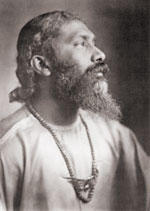 A person may belong to the best religion in the world; he does not live it, perhaps, but merely belongs to it. He says that he is a Muslim, or a Christian, or a Jew. He is sure it is the best religion, but at the same time he does not care to live it; he just belongs to it and thinks that belonging to a certain accepted religion is all that is needed. And people of all the different religions have made this to appear to be so, owing to their enthusiasm and forced by their mission in life. For they have made facilities for those who belong to their particular religion, saying that by the very fact of their belonging to it they will be saved on the Day of judgment. While the others, with all their good actions, will not be saved because they do not belong to that particular faith.
A person may belong to the best religion in the world; he does not live it, perhaps, but merely belongs to it. He says that he is a Muslim, or a Christian, or a Jew. He is sure it is the best religion, but at the same time he does not care to live it; he just belongs to it and thinks that belonging to a certain accepted religion is all that is needed. And people of all the different religions have made this to appear to be so, owing to their enthusiasm and forced by their mission in life. For they have made facilities for those who belong to their particular religion, saying that by the very fact of their belonging to it they will be saved on the Day of judgment. While the others, with all their good actions, will not be saved because they do not belong to that particular faith.
This is a man-made idea, not God-made. God is not the Father of one sect; God is the Father of the whole world, and all are entitled to be called His children, whether worthy or unworthy. In fact it is man's attitude towards God and truth which can bring him closer to God, who is the ideal of every soul. And if this attitude is not developed, then whatever man's religion be he has failed to live it.
But one should always keep in mind that religion has both a body and a soul. Whatever body of religion one may touch, one touches the soul; and of one touches the soul, one touches all its bodies, which are like its organs. Therefore on the path of religion, the dispute about who is right and who is wrong is not necessary. We do not know what is in the heart of a man. If outwardly he seems to be a Jew, a Christian, a Muslim, or a Buddhist, we cannot be the judge of his religion, for every soul has a religion peculiar to itself, and no one else is entitled to judge it. There may be a person in a very humble garb, without any appearance of belief in God, or of piety or orthodoxy, and he may have a religion hidden in his heart, which not everybody can understand. And there may be another person who is highly evolved, and yet his outward conduct, which alone manifests to people's view, may appear to be altogether contrary to their own way of looking at things. They may accuse him of being a materialist or an unbeliever, or someone who is far from God and truth. And yet we do not know; sometimes appearances are merely illusions; behind them there may be hidden the deepest religious devotion or the highest ideal, of which we know very little.
… therefore, the best thing is to respect a man's belief, his idea, his way of looking at life, whatever it may be, even if it is quite different from his own way of looking at it. It is this spirit of tolerance which, when developed, will bring about the brotherhood which is the essence of religion and the need of the present day.
To say, 'You are different and I am different, your religion is different and my religion is different, your belief is different and my belief is different,' will not unite, it will only divide humanity. Those who, with the excuse of their great faith in their own religion, hurt the feelings of another and divide humanity which has the same source and goal, abuse religion, whatever be their faith. The message, at whatever period it came to the world, did not come just to a certain section of humanity; it did not come to raise only some few people who perhaps accepted the faith, the message, or a particular organized Church. No, all these things came afterwards.
The rain does not fall in a certain land only; the sun does not shine only on a particular country. All that comes from God is for all souls. If they are worthy, they deserve it; it is their reward; if they are unworthy, they are the more entitled to it. Verily, blessing is for every soul; for every soul, whatever be his faith or belief, belongs to God.
Compiled from the Message of Hazrat Inayat Khan
www.wahiduddin.net/index.html














COMMENTS